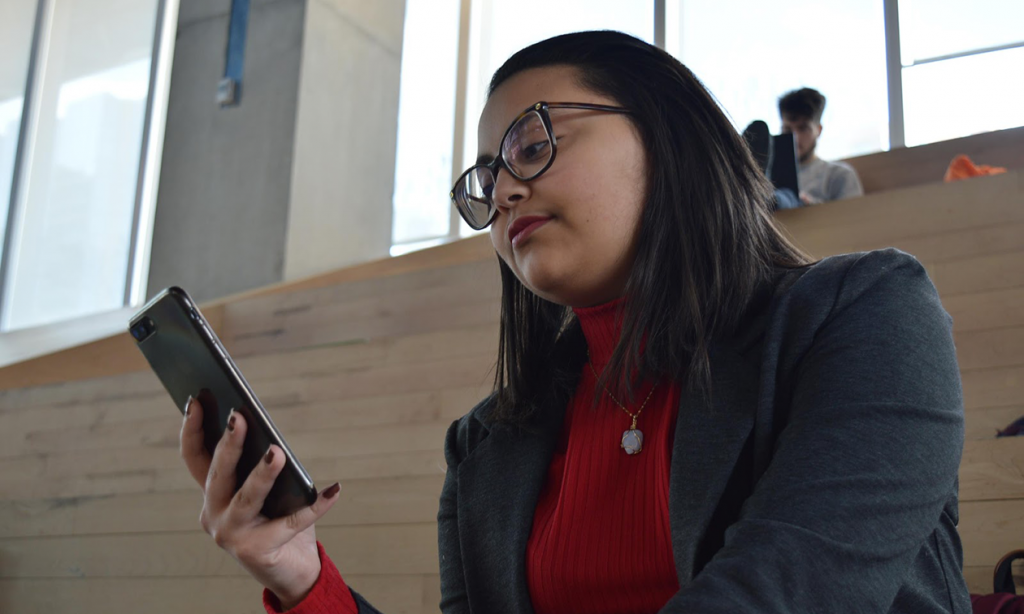By Charlie Buckley

It’s a routine. Abir Dabbour uploads a picture, perfects the caption and prepares to hit “post.” But then she pauses, gives in to the nagging fear that this might follow her into her career and hits “cancel.” Another sacrifice for her future in the world of politics.
Dabbour, a member of the Ryerson Young Liberals and losing candidate in the recent Ryerson Students’ Union election, is grappling with the reality of modern image politics – a reality that requires aspiring young politicians to mercilessly sanitize their social feeds. To avoid bad press in the coming years, every post, comment, like, share, tweet and photo must be carefully curated before it goes out to public view. Even more ruthlessness is required for the culling of older posts from a less careful time. The present must be vetted, and the past must be scrubbed clean. Failure to do so can mean political ruin.
“We do our best to vet our candidates, and part of that is looking into their social media,” says Andrea Horwath, leader of the Ontario New Democratic Party. “In some cases, we will disqualify people, but we also acknowledge that people have past lives, and they should also be able to participate in electoral politics as they shed their past lives – or learn from them.”
Stephen Lecce, parliamentary assistant to Ontario Premier Doug Ford, says that he “encourages young people to be judicious, but to be authentic” about their social footprint. “We need to be role models, to the extent possible, to the people we represent.”
“If your words and actions today were printed on the front page of every single newspaper tomorrow, would you still say and do what you’re going to do, right now?” says Kristyn Wong-Tam, city councillor for Toronto’s Ward 13. “That’s the best guiding principle that I work with.”
Dabbour says vigilance is part of her day-to-day reality.
“That’s only natural though, considering we’ve all been through phases and ideologies we’re less proud of,” Dabbour says. “It’s what it means to grow up.”
Others have learned the hard way, following the unearthing of controversial, racially charged social media posts. These include 2015 B.C. Liberal candidate Cheryl Thomas, former Saskatchewan Health Authority director Donald Rae and 2019 Burnaby South byelection candidate Karen Wang.
Want to catch up? Watch this video on Canadian social media scandals.
Ryerson University social media expert Anatoliy Gruzd says clawing something back isn’t easy and, in fact, may be impossible.
The “delete” button, he says, won’t solve all of an aspiring politician’s problems. With so much going on behind the scenes on social media platforms like Twitter, Facebook and Instagram, users shouldn’t rely on a single click to make the problem go away.
Gruzd says social media data such as tweets, posts, comments and shares are kept, at least temporarily, on company servers after the point of deletion. During this time, however, third parties armed with the right tools can still access it. Even by simply taking screenshots shortly after a post is made, someone can quickly and easily ensure that it will never be completely scrubbed from the internet.
The best way to keep clean, it turns out, is to never make controversial posts in the first place.
“Everyone should be quite cautious and recognize that there is a digital footprint that remains quite permanent,” Wong-Tam says. “In the moment, if you have no impulse control, you can say things that you could live to regret.”
This is a joint byline.
Ryersonian staff are responsible for the news website edited and produced by final-year undergraduate and graduate journalism students at Ryerson University.
It features all the content from the weekly campus newspaper, The Ryersonian, and distributes news and online multimedia, including video newscasts from RyersonianTV.
Ryersonian.ca also provides videos, images, and other interactive material in partnership with the School of Journalism.

